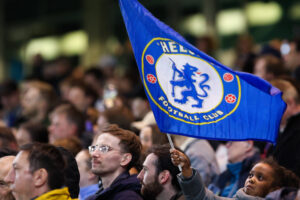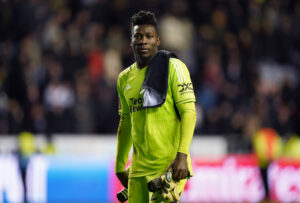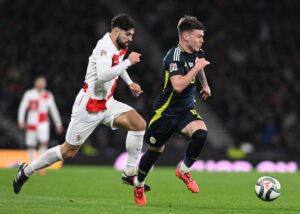Seven weeks ago, Luka Modric was in a similar yet different position to where he currently finds himself.
Back then, in the capital city of a nation bordering the one hosting the World Cup, Modric went the full 90 minutes in Real Madrid’s 3-1 victory over Liverpool in the UEFA Champions League Final. His efforts helped preserve a modern dynasty for the most dominant club in the history of European competition. It marked the Galacticos’ third straight Champions League trophy, its fourth in five years, and 13th of all-time.
Fast forward to the present and Modric’s national team, Croatia, is also on the cusp of championship glory. But it’s a situation that’s in complete contrast to the one he and fellow Real Madrid teammate Mateo Kovacic were part of at club level. Though Croatian football has always been competitive on the international stage, it’s certainly never been mentioned in the same breath as the game’s traditional powerhouses.
That all can change on Sunday if Croatia upends France to become the ninth nation in history to win the World Cup. It’s a tantalizing proposition for this nation of 4.2 million trying to become the second-smallest to hoist the trophy behind Uruguay. And how it reached this point carries with it an almost magical feel which points to the idea it’s meant to be.
This Croatia World Cup Squad Has an Aura of Destiny Surrounding It
Redemption for Modric Against Denmark
Throughout the group stage, Modric made as compelling a case for Golden Ball award consideration as any player in the tournament. Whether it was his team-leading three tackles against Nigeria, his magnificent long-range goal against Argentina, or passing at a 93 percent accuracy rate against Iceland, Modric did it all. His exploits played a pivotal role in Croatia finishing group play as one of three teams to claim all nine points.
That dominance simply wasn’t there in the round of 16. They conceded an opening minute goal to Denmark and though they equalized almost immediately thereafter, they just couldn’t get into any sort of rhythm offensively. The score remained 1-1 after 90 minutes. But 24 minutes into extra time, Modric fired a precise through ball to Ante Rebic who Zanka eventually took down in the box. It was then that Modric suffered his worst moment of the tournament when Kasper Schmeichel denied his effort from the penalty spot.
That development certainly didn’t bode well for Croatia as the game needed penalties to determine a winner. You couldn’t help but assume that Schmeichel had a mental edge over all five kick takers. But then Danijel Subasic raised Schmeichel himself, saving three of Denmark’s five attempts. Couple that with Modric experiencing redemption in beating Schmeichel in the shootout along with Ivan Rakitic sealing the deal and it was onto the quarters with the host nation awaiting.
The Left Post That Owed Croatia in the Quarterfinals
Russia vs Croatia kind of felt like the battle for the glass slipper. For whoever emerged victorious on the north coast of the Black Sea in Sochi essentially became the Cinderella of the semifinals. The home-standing Russians already had such a vibe after shocking 2010 champions Spain via penalties in the previous round. That momentum, combined with a partisan crowd of 44,287 behind them at Fisht Stadium, made it all the more challenging for Croatia to keep their World Cup run going.
These two sides went back and forth in what turned out to be one of the most entertaining matches of the tournament (and that’s saying something). Eight minutes after Denis Cheryshev put Russia up with a golazo in the first half, Andrej Kramaric found an equalizer. And Croatia nearly had the go-ahead goal courtesy of Ivan Perisic around the hour mark. But his effort glanced off the left post and ricocheted across the goal so tantalizingly close to crossing the goal line. If the ball had been just a few inches to the right, it would have.
And so another extra time session beckoned for both teams. Modric showcased his chance-creation exploits from the corner flag when he assisted on Domagoj Vida’s 101st-minute header to give Croatia the lead. Russia subsequently sent Sochi into pandemonium when Mario Fernandes headed in his own goal 14 minutes later. That meant penalties once more. And the ensuing shootout gave Croatia poetic justice when Modric’s penalty did what Perisic’s second-half shot did…carom off the left post. Only this time, it went in.
Croatia ultimately won its second-straight spot kick duel to progress to the semis. It was a well-earned result given the grinding nature of their performance. When you combine aerials won and successful dribbles, Croatia outgained Russia 72-35. Modric himself dribbled past an opposing defender eight times, accounting for nearly 35 percent of his team’s total. He also tallied four of Croatia’s 12 key passes.
Tired Legs? What Tired Legs
The indefatigable nature of this Croatian World Cup run certainly got put to the test in the semifinals. Heading into their clash with England, an oft-cited narrative surrounded the potential for heavy legs given the 240 minutes of knockout round action combined with the mental drain of two penalty shootouts. You couldn’t help but worry about that early on when Modric plowed through Dele Alli at the top of the box. It led to Kieran Trippier opening the scoring in the fifth minute with a “bend it like Beckham” kind of set-piece strike.
One-man teams, by and large, don’t win World Cups. For all the talk of Modric as a Golden Ball front-runner and even a Ballon d’Or candidate, he can’t do it himself. History has proven this. 17 of the 20 World Cup winners finished no worse than third when it comes to the number of players on their respective team who registered at least one goal in that particular tournament. Croatia now has eight which is tied for the best in Russia. And two figures stepped up to the plate against England.
The first was Perisic who redirected a well-flighted Sime Vrsaljko cross past Jordan Pickford midway through the second half to equalize. Just a few minutes after that, he nearly had another. But for the second time in as many games, the iron proved unkind with his 72nd minute shot hitting the right post. Fortunately for Croatia, neither that nor the fact they went to extra time for the third straight game mattered. For in the 109th minute, Perisic solidified man of the match honors by outdueling Trippier and dropping a dime to Mario Mandzukic who put the “cardiac Croats” up for good.
The Task at Hand
Modric’s post-game comments in the aftermath of Croatia’s semifinal triumph indicate that his team used the idea they were going to wilt against England due to fatigue as motivation. Be that as it may, such sentiment isn’t going to subside heading into Sunday’s final. Given that all three of their games needed more than regulation, Croatia essentially has an entire extra match in their legs relative to France. Of those who’ve appeared in at least four matches, Croatia players are averaging 527.7 minutes while French players in the same category have logged 476.9.
That’s a harrowing prospect against a French outfit boasting quite a few players renowned for their fitness. Look no further than N’Golo Kante. The 27-year-old is the modern incarnation of the “Claude Makelele role” for Les Bleus. His ability to cover prodigious amounts of ground, win the ball and distribute it into favorable pockets of space is as good as any player in the world. Needless to say, he and Paul Pogba vs Modric and Rakitic are among the more intriguing storylines heading into Sunday’s winner-take-all-clash.
On paper, the advantage appears to go to France. The betting lines certainly tout them as favorites with Croatia as much as a 4/1 underdog at some sportsbooks. A confluence of the mileage on Croatia’s legs combined with a perceived talent edge in France’s direction is likely a contributing factor. But sports aren’t played on paper. If they were, Croatia wouldn’t be one win away from world football’s ultimate achievement.
In the NBA and NHL, you often hear the phrase “game seven: the two best words in sports.” That’s especially true when the Larry O’Brien Trophy or Stanley Cup is on the line. It’s a mantra that speaks to an ultimate showdown the finality of which is championship ecstasy. For France and Croatia, this is game seven. And the latter’s ability to survive and advance in the World Cup’s win or go home stage projects a palpable sense of serendipitous fortune which hints that a “miracle in Moscow” is on the horizon.






